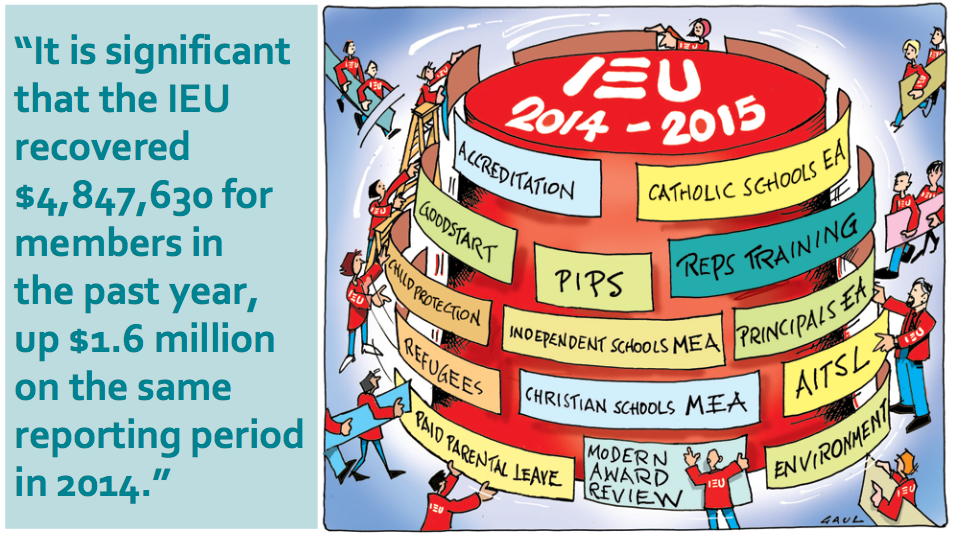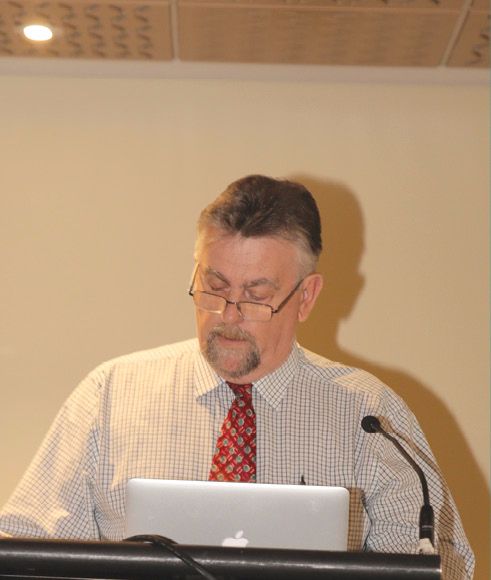Almost all of our industrial work as a Union is in the federal jurisdiction. Work like agreement making, negotiations with employers, settling disputes or dealing with unfair dismissals. Even visiting workplaces to talk to members is ‘federal work’.
The legislation under which we operate is the Fair Work (Registered Organisations) Act and some of the provisions of that Act require the Union to substantially alter a number of its practices and processes.
For many years, our members have been enrolled in two unions, the state organisation and the NSW/ACT Branch of the IEUA. In the past, we operated almost exclusively as the state body but in recent years we have been transitioning to function more properly as a federal branch. Much work has been done in this area and is ongoing, however, quite a few formalisation processes remain to be completed.
The key issues to address are ensuring that membership fees are paid direct to the branch, transferring the employment of staff from the state organisation to the branch (to allow Right of Entry Permits) and establishing sub-branches and a State Council in the rules of the NSW/ACT Branch to replicate those existing bodies.
While the mechanics of all this are cumbersome and time consuming, it is essential that our rules and practices reflect the reality of our operations.
Shameless tactics
I wrote last year that the end result of the shameless and deceptive tactics employed by Catholic employers (represented by the Catholic Commission of Employment Relations) to strip conditions and reduce wages for employees would be to “outrage our members, lose the trust and confidence of thousands of employees and put themselves on the back foot in resolving the dispute”. And so it was. And it remains.
During this dispute, we had more than 500 successful industrial action ballots and through this strength and determination of members, we put back what employers had tried to remove and rebuilt what they had tried to dismantle.
It is worth noting the participation for the first time and in significant numbers of our support staff members who were present and vocal at every stop work meeting and rally. While it was a long and frustrating campaign, we secured a very good agreement. Although not unanimously supported, I do believe we have achieved an EA which is outstanding now and can provide a scaffold for the future.
Industrial work
The industrial work of unions is largely the basis on which they are judged; it is core and essential work. The Industrial Annexure details not only the unfolding of the protracted dispute involving the systemic EA but the progress of other negotiations as well as the 57 Agreements (38 in early childhood education and care) we have successfully negotiated and registered since the last AGM.
The industrial report also details several individual employment cases of enormous significance to the membership generally and I urge a close reading of these. These cases intersect with Working with Children Check issues raised in the Child Protection report and overlap with BOSTES and Teacher Quality Council accreditation and registration requirements.
We continue to have major concerns regarding investigation processes and procedures with some employers and it is noteworthy that child protection matters remain in the top three causes of industrial disputation.
It is significant also that the IEU recovered $4,847,630 for members in the past year, up $1.6 million on the same reporting period in 2014.
Union objects
The objects of the Union require us “to encourage and initiate whatever may tend toward improving the status, training and qualification of all members” and we shall proudly continue to do that.
I make mention of this because our objects stated in the rules of the Union are often overlooked but are fundamental to who we are and what we do. During the term break, we provided our training room as a venue for BOSTES officers to speak to approximately 70 of our members about accreditation at higher levels. Once we put a rate of pay in our agreements for Highly Accomplished Teachers, we assumed a responsibility to provide easy access to information about the application process.
Proud are we also of our commitment to Union Training for our Chapter Representatives to which we devote substantial resources. The past year has seen 14 training days with more than 200 participants and further events are scheduled before the end of the year. The Activist Conference is a key part of our training agenda. The Union Executive has identified recruitment and retention of members as focus issues for Reps training and at Branch meetings in 2016.
Recruitment and organising are fundamental to the ongoing viability of every union and ours is an ageing membership with at least 1000 retirements each year. A recent report identified a number of areas in NSW where those aged over 65 outnumbered those under 15. In addition, there is significant ‘churn’, particularly among teachers who move between systems and employers regularly.
Recruitment
Our recruitment levels are strong and boosted further by increasing levels of student members. We have recruited 2753 new members this calendar year, including 631 students. While the vast majority of those studying early childhood will work in our sector and we hope to retain them as full members, we can at least aspire to providing a positive experience of trade unionism.
While our numbers stand at a tad over 32,000, our growth in real terms is fairly flat.
Indigenous issues
Another area of unfinished business for our Union is with our Indigenous members and with the wider Indigenous community. We are disappointed that our PIP An Indigenous Perspective, which addresses Standards 1.4 and 2.4, our only PIP to date registered with the ACT TQI, falls foul of their refusal to allow registration of programs for more than two years.
We have recently called for Indigenous members to self identify for a working party to better target strategies for addressing Aboriginal and Torres Strait Islander issues and to promote reconciliation activities and awareness. We were obliged to advertise because the IEU has never asked its members whether they identify as Indigenous for the purpose of us keeping records. One of the first tasks of this working party will be to make a recommendation as to whether we should. There is a significant agenda of other work to be done and advice to be gleaned.




































































































































